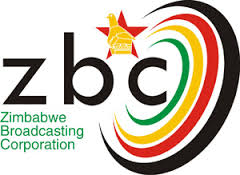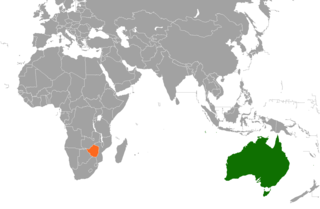 | |
Turkey | Zimbabwe |
|---|---|
Turkey has an embassy in Harare. Zimbabwe opened its embassy in Ankara on October 3, 2019. [1]
 | |
Turkey | Zimbabwe |
|---|---|
Turkey has an embassy in Harare. Zimbabwe opened its embassy in Ankara on October 3, 2019. [1]
Turkey and Zimbabwe generally had friendly relations until 1990. Turkey did not recognize Rhodesian Front-led UDI of Rhodesia because of the lack of racial accommodation in the Rhodesian Front. [2] In Rhodesia — the approximately 5% white community had a system similar to Jim Crow [3] that sustained racial discrimination. [2] After Ian Smith as Prime Minister of Rhodesia declared Rhodesian independence on November 11, 1965, Turkey joined the British to exert pressure on Ian Smith’s government through economic sanctions. [4] When the economic sanctions largely failed, the black population of Rhodesia began to organize and were assisted by Mozambique’s Frente de Libertação de Moçambique that allowed ZANU’s guerrillas to set up bases in neighboring Mozambique and declared war on Ian Smith’s Rhodesia, which allowed for majority-rule in Zimbabwe. [4]
By 1992, Turkey provided £47 million [5] out of the £900 million in total that the international community pledged as foreign aid to the government formed by Robert Mugabe, who initially won plaudits for protecting the white community in Zimbabwe. [4]
Turkey’s relations with Zimbabwe became very tense [6] when Robert Mugabe’s government started confiscating [5] white-owned farms without compensation and later ordered Operation Murambatsvina (chiShona: “cleaning up the shit”) to attack the Shona people who lived in the shantytowns around Harare, bulldozing 100,000 homes. [6] This led to, according to UN estimates, the death of 1.2 million people. [6]

Rhodesia, officially from 1970 the Republic of Rhodesia, was an unrecognised state in Southern Africa from 1965 to 1979, equivalent in territory to modern Zimbabwe. Rhodesia was the de facto successor state to the British colony of Southern Rhodesia, which had been self-governing since achieving responsible government in 1923. A landlocked nation, Rhodesia was bordered by South Africa to the south, Bechuanaland to the southwest, Zambia to the northwest, and Mozambique to the east. From 1965 to 1979, Rhodesia was one of two independent states on the African continent governed by a white minority of European descent and culture, the other being South Africa.

Zimbabwe, officially the Republic of Zimbabwe, is a landlocked country located in Southeast Africa, between the Zambezi and Limpopo Rivers, bordered by South Africa to the south, Botswana to the south-west, Zambia to the north, and Mozambique to the east. The capital and largest city is Harare. The second largest city is Bulawayo. A country of roughly 15 million people, Zimbabwe has 16 official languages, with English, Shona, and Ndebele the most common. It was once referred to by Samora Machel as the "Jewel of Africa" for its great prosperity during the early years of Robert Mugabe.

Land reform in Zimbabwe officially began in 1980 with the signing of the Lancaster House Agreement, as an effort to more equitably distribute land between black subsistence farmers and white Zimbabweans of European ancestry, who had traditionally enjoyed superior political and economic status. The programme's stated targets were intended to alter the ethnic balance of land ownership.

Joshua Mqabuko Nyongolo Nkomo was a Zimbabwean revolutionary and Matabeleland politician who served as Vice-President of Zimbabwe from 1990 until his death in 1999. He founded and led the Zimbabwe African People's Union (ZAPU) from 1961 until it merged in 1987 with Robert Mugabe's Zimbabwe African National Union (ZANU) to form ZANU–PF after an internal military crackdown that claimed more than 20,000 of ZAPU supporters.

The national flag of Zimbabwe consists of seven even horizontal stripes of green, gold, red and black with a white triangle containing a red five-pointed star with a Zimbabwe Bird. The present design was adopted on 18 April 1980. The soapstone bird featured on the flag represents a statuette of a bird found at the ruins of Great Zimbabwe. The bird symbolises the history of Zimbabwe; the red star beneath it officially stands for the nation's aspirations but is commonly thought to symbolise socialism, and the revolutionary struggle for freedom and peace. The design is based on the flag of Zimbabwe's ruling party, the Zimbabwe African National Union – Patriotic Front.
Chimurenga is a word in the Shona language. The Ndebele equivalent, though not as widely used since the majority of Zimbabweans are Shona speaking, is Umvukela, meaning "revolutionary struggle" or uprising. In specific historical terms, it also refers to the Ndebele and Shona insurrections against administration of the British South Africa Company during the late 1890s—the Second Matabele War, or First Chimurenga—and the war fought between African nationalist guerrillas and the predominantly white Rhodesian government during the 1960s and 1970s—the Rhodesian Bush War, or Second Chimurenga/Imvukela.

The Zimbabwe Broadcasting Corporation (ZBC) is the state-controlled broadcaster in Zimbabwe. It was established as the Rhodesian Broadcasting Corporation (RBC), taking its current name in 1980. Like the RBC before it, the ZBC has been accused of being a government mouthpiece with no editorial independence.

The Rhodesian Bush War, also called the Second Chimurenga as well as the Zimbabwe War of Liberation, was a civil conflict from July 1964 to December 1979 in the unrecognised country of Rhodesia.
White Zimbabweans are people in Zimbabwe who are of European descent. In linguistic, cultural, and historical terms, these Zimbabweans of European ethnic origin are mostly English-speaking descendants of British settlers and a small minority of them are either Afrikaans-speaking descendants of Afrikaners from South Africa and/or those descended from Greek and Portuguese immigrants.

United States–Zimbabwe relations are bilateral relations between Zimbabwe and the United States. Both countries share a common history and language as former British colonies.

Foreign relations exist between Australia and Zimbabwe. Both countries have full embassy level diplomatic relations. Australia currently maintains an embassy in Harare, and Zimbabwe maintains an embassy in Canberra.

Zimbabwe and the Commonwealth of Nations have had a controversial and stormy diplomatic relationship. Zimbabwe is a former member of the Commonwealth, having withdrawn in 2003, and the issue of Zimbabwe has repeatedly taken centre stage in the Commonwealth, both since Zimbabwe's independence and as part of the British Empire.
Sabina Gabriel Mugabe was a Zimbabwean politician. She was the younger sister of the former Zimbabwean president Robert Mugabe.
Bernard Thomas Gibson Chidzero was a Zimbabwean economist, politician, and writer. He served as the independent Zimbabwe's second finance minister.

The Geneva Conference took place in Geneva, Switzerland during the Rhodesian Bush War. Held under British mediation, its participants were the unrecognised government of Rhodesia, led by Ian Smith, and a number of rival Rhodesian black nationalist parties: the African National Council, led by Bishop Abel Muzorewa; the Front for the Liberation of Zimbabwe, led by James Chikerema; and a joint "Patriotic Front" made up of Robert Mugabe's Zimbabwe African National Union and the Zimbabwe African People's Union led by Joshua Nkomo. The purpose of the conference was to attempt to agree on a new constitution for Rhodesia and in doing so find a way to end the Bush War raging between the government and the guerrillas commanded by Mugabe and Nkomo respectively.

Mexico–Zimbabwe relations are the diplomatic relations between the United Mexican States and the Republic of Zimbabwe. Both nations are members of the Group of 15 and the United Nations.

David Colville Smith was a farmer and politician in Rhodesia and its successor states, Zimbabwe Rhodesia and Zimbabwe. He served in the cabinet of Rhodesia as Minister of Agriculture from 1968 to 1976, Minister of Finance from 1976 to 1979, and Minister of Commerce and Industry from 1978 to 1979. From 1976 to 1979, he also served Deputy Prime Minister of Rhodesia. He continued to serve as Minister of Finance in the government of Zimbabwe Rhodesia in 1979. In 1980, he was appointed Minister of Trade and Commerce of the newly independent Zimbabwe, one of two whites included in the cabinet of Prime Minister Robert Mugabe.

Relations between the UK and Zimbabwe have been complex since the latter's independence in 1980. The territory of modern Zimbabwe had been colonised by the British South Africa Company in 1890, with the Pioneer Column raising the Union Jack over Fort Salisbury and formally establishing company, and by extension, British, rule over the territory. In 1920 Rhodesia, as the land had been called by the company in honour of their founder, Cecil Rhodes, was brought under jurisdiction of the Crown as the colony of Southern Rhodesia. Southern Rhodesia over the decades following its establishment would slowly be populated by large numbers of Europeans emigrants who came to form a considerable diaspora, largely consisting of Britons but also smaller groups of Italians, Greeks and Afrikaners. A settler culture that had already existed since the time of company would come to cement fully and the white population began to identify as Rhodesians, often in conjunction with British/Afrikaner/Southern European identities of their ancestors. Southern Rhodesia would go on to participate heavily in both the First and Second wars, providing soldiers and military equipment to the British war effort. During the years after the war, the relationship between Britain and Southern Rhodesia became increasingly strained. The UK had opted to decolonise Africa and had adopted a firm policy of no independence before majority rule, which deeply upset the white establishment of the colony, in particular the radical Rhodesian Front party led by Winston Field and later, Ian Smith. Relations between the British Government and the colonial Southern Rhodesian government deteriorated for much of the early 1960s and negotiations between the two dragged on with little to no success. Eventually, relations broke down entirely and Southern Rhodesia unilaterally declared independence from Britain. The move was met with zero recognition from the international community and the UK government and the illegitimate state was still formally considered under British sovereignty for its roughly 15-year span of existence. For the first 5 years of its proclamied independence, Rhodesia still declared loyalty to the Queen Elizabeth II as a would-be Commonwealth realm, but this was never recognised by the British monarch who continued to encourage Smith's illegal government to resign. Given her refusal to appoint a Governor-general, from 1965 to 1970 an "Officer Administering the Government" served as the de facto head of state. Rhodesia eventually moved to sever all links with Britain and became a republic with a president in 1970. Throughout the subsequent Rhodesian Bush War between white Rhodesians and black paramilitaries such as ZANU and ZAPU, the UK continued to remain staunchly opposed to the rogue state and extensively sanctioned it, even enforcing blockades using the Royal Navy to cut off Rhodesian oil imports via Portuguese Mozambique. When Rhodesia failed to hold out after 15 years of fighting and came to the negotiating table with the black resistance groups and moderate African nationalist parties, the UK again became directly involved in Rhodesia's affairs. After a brief stint as the nation of Zimbabwe Rhodesia following an Internal Settlement that was denounced by the international community for not being satisfactory enough, the nation transiently reverted to its status as a self-governing British colony before being granted full independence and majority rule as Zimbabwe in 1980 under the landmark Lancaster House Agreement.
Zimbabwe House, formerly called Independence House and Dzimbahwe, is an official residence of the President of Zimbabwe in Harare, Zimbabwe. It was built in 1910 as was used as the house of the Prime Minister of Southern Rhodesia, Prime Minister of Rhodesia, Prime Minister of Zimbabwe Rhodesia and Prime Minister of Zimbabwe.